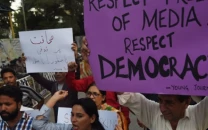Blundering in Balochistan
The government of Balochistan is right in rejecting the proposals suggested by Interior Minister Rehman Malik.

This kind of ham-handed approach needs to be avoided since it gives the distinct impression that the centre is not interested in what the people of the province want – they want the FC out of the provinces and its various check posts disbanded – but that it wants to impose its own ‘solutions’ on it. Mr Malik’s ‘solution’ is only going to alienate the province further. Having said that, let us not forget that the FC is already deployed in Balochistan and has set up check posts in recent months along various intra-provincial roads. Furthermore, it was the provincial government itself which had sought the deployment of the FC in Quetta when things began to get out of hand with target killings of teachers and settlers in the provincial capital. But doing what the interior minister wants is not going to help matters or bridge the trust deficit in the province.
But before any prescriptions can be suggested, it would be instructive to get to the bottom of what exactly constitutes and causes the trust deficit. In recent years, several committees have been formed on the issue of how to address the province’s grievances. During the last government, there was one committee on constitutional reform and another on socio-economic development, headed by Senators Wasim Sajjad and Mushahid Hussain. They held meetings with much fanfare and came up with many recommendations all of which, it seems, were put in the dustbin. Then, during the tenure of the current government, the president apologised to the people of the province for the cold-blooded murder of Nawab Akbar Bugti and his government promised that the hundreds of Baloch who had disappeared in recent years would soon be released. While the apology, though long overdue, was well-intentioned, it was only cosmetic and substantive initiatives on the missing persons issue came to nothing. Again, for the people of the province, this would reinforce the widespread public perception that policy on their province is determined not so much by Islamabad as Rawalpindi because, after all, what could possibly be delaying the government’s implementation of its own pledge on the missing persons case?
The perception – right or wrong -- among many Baloch that policy is influenced more by the men in khaki is also reinforced by theories, usually sprouted by those part of or close to the establishment, of the interference by several foreign countries, especially India, in Balochistan. New Delhi has vociferously denied this and Islamabad has never given proof publicly of this involvement and from that one can make out that this is perhaps a red herring. Afghanistan has also been implicated, especially because of its alleged support to the now-banned Baloch Liberation Army. However, it is precisely because of this frustration and resentment that the trust deficit exists and if, for the sake of argument, India and/or Afghanistan are interfering then that is because they are exploiting the frustration and resentment that already exists because successive governments at the centre have chosen to impose their own prescriptions on the province and have seen it more as a revenue-generating region than as a part of the federation. Instead of ceding police powers to the FC, the centre should immediately implement the recommendations of the commissions mentioned above and resolve the missing persons’ issue.
Published in The Express Tribune, September 10th, 2010.


















COMMENTS
Comments are moderated and generally will be posted if they are on-topic and not abusive.
For more information, please see our Comments FAQ